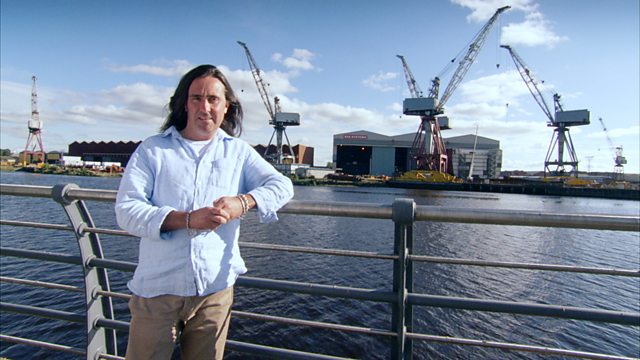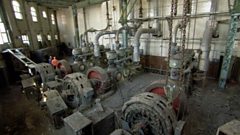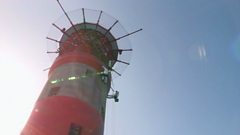
Celebrating the workers from around our shores. Nick Crane tells the tale of a refrigeration plant whose workers kept Britain's biggest fishing fleet afloat.
Coast celebrates the surprising stories of the workers from around our shores. From foundry men who burnished the secrets of our sea power, to the superstar performers who wowed the crowds in Edwardian resorts, these are tales of the hard grafters who made Britain great.
Nick Crane tells the tale of an abandoned refrigeration plant whose workers kept Britain's biggest fishing fleet afloat. How did their ingenious production line create the tons of ice needed each day to keep the fish from Grimsby's trawlers fresh for the nation's plates? The Grimsby Ice Factory, dating from 1901, was one of the few sites in the country that could freeze water on an industrial scale. The Ice Factory closed in 1990, but the last man to work there returns to bring the whole process back to life.
At the port on the River Tyne, Nick joins a team of drivers on a race against time to precision-park hundreds of new British-built cars aboard a huge purpose-built car-transporter.
Neil Oliver relives a remarkable tale - when thousands of shipyard workers on the river Clyde fought job losses not by walking out on strike, but by 'working-in'. In 1971 the Clydeside work-in was a revolutionary new tactic; the struggle to keep on working whatever the bosses said attracted worldwide financial support, including red roses and cash from John Lennon and Yoko Ono. It is credited with saving shipbuilding on the upper Clyde, but is the legend of the work-in all that it seems? For the first time, the man the government put in charge of the yards tells the story from his perspective, a version of events which re-writes the accepted history.
Tessa Dunlop reveals the untold story of the secret of the Royal Navy's sea power, some 200 years ago. In Nelson's navy the British guns were more accurate than those of our enemies, thanks to our ability to manufacture super-smooth and perfectly round cannonballs. The secret ingredient was a rare mineral called plumbago. The purest plumbago existed in only one mine in the world, near the port of Whitehaven. Tessa explores the abandoned mine workings to find the long-forgotten source of plumbago. Can she rediscover its remarkable properties by making her own cannonballs?
And Ken Dodd joins Ian McMillan to celebrate the entertainers who worked so hard to get laughs from the holidaymakers of Blackpool in its heyday. For one night only they stage a unique show at the resort's historic Grand Theatre: Edwardian Britain's Got Seaside Talent! Mega-stars of the Edwardian age, like 'Little Titch', were household names, while Vesta Tilley's cross-dressing turn as a young dandy-about-town earned her the equivalent of 拢20,000 per week. Will their acts still stand up today? Tribute acts take to the stage to find out.
Last on
More episodes
Previous
Clips
-
![]()
The extraordinary Grimsby Ice Factory
Duration: 03:52
-
![]()
The art of parking cars
Duration: 03:29
-
![]()
Painting a lighthouse
Duration: 02:34
Credits
| Role | Contributor |
|---|---|
| Presenter | Nicholas Crane |
| Presenter | Tessa Dunlop |
| Presenter | Miranda Krestovnikoff |
| Presenter | Neil Oliver |
| Presenter | Ian McMillan |
| Participant | Ken Dodd |
| Series Editor | Steve Evanson |
| Executive Producer | William Lyons |
Broadcasts
Meet the Coast team
Presented by a team of experts, between them they can investigate almost anything!
Explore your world with 91热爆 Earth
Visit 91热爆 Earth, the new home of wildlife on the 91热爆.



